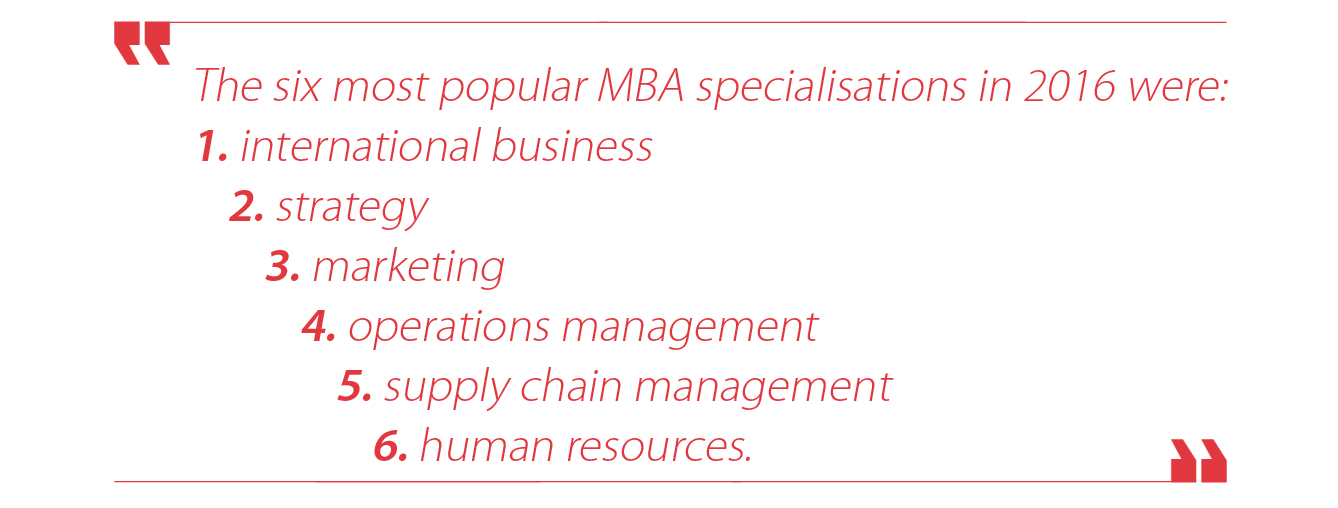Specialist and generalist MBAs: Which one is best for you?
First, there was the MBA, established by Harvard Business School in 1908. Interestingly, South Africa offered an MBA before Europe did. The University of Pretoria awarded its first MBAs in 1951 while INSEAD in France only awarded its first MBAs in 1960.
Soon, MBAs were everywhere. To stand out, business schools started to offer specialist MBAs alongside their generalist MBAs. Initially, MBA specialisations focused on one functional area of management, such as Finance, Marketing or Strategy.
According to the QS website Top MBA, the six most popular MBA specialisations in 2016 were international business, strategy, marketing, operations management, supply chain management and human resources.
But the MBA is the one business management qualification that has always been reinventing itself. This article in the UK’s Independent newspaper explained it well, saying that the evolving requirements of employers and students, and the revolutionary changes caused by technology “have been met by a willingness by the best business schools to change the what, the how, and … the where they teach”.
Now there is new generation of specialised MBAs focused on industry sectors. This means you can do an MBA in Luxury Goods, Healthcare, Aviation, Energy, Supply Chain Management, the Football Industry, Wine and Spirits, Shipping and Logistics, and even the Thoroughbred Horseracing Industry.
How does one choose between a generalist MBA and a specialist MBA? If you want to take on a leadership role where you need to understand all the functional areas of a business – any business – you will benefit from a generalist MBA. The generalist MBA is therefore best for career switchers.
Then there is the trend to specialise – whether through a specialist MBA or a regular MBA with a concentration of modules in a specific discipline. This will enable you to:
• Gain domain-specific expertise at managerial level
• Show your commitment to make it in a specific industry sector
• Stand out from the crowd.
Admittedly, certain specialised MBAs offer more scope in terms of career choices. For example, an MBA focused on health care will benefit a wide range of professions – from senior nurses who manage large teams to general practitioners or physiotherapists who want to establish a practice and administrators running clinics and hospitals. A master’s in managing an international business can open doors to a myriad of for-profit and non-profit organisations.
You can also scan the environment for scarce-skills areas. For instance, according to the Bureau of Labor Statistics in the USA, there will be a 26% increase in logistics roles by 2020. If you can see yourself working in this field for the next two decades or so, an MBA in Supply Chain Management will future-proof your career.
It is important to note that the same management fundamentals are taught on generalist and specialist MBAs. The difference is that specialisation (usually through core modules, electives and/or an international study module) focuses on the application of these fundamentals in a specific field to give you advanced know-how of that industry.
These pointers can help you decide on a specialist MBA:
• Do research on the market demand for the skills set covered by the specialist MBA.
• Ask whether you can see yourself working in this field for the next 30 years. Is there enough
scope to work your way up to senior management level or to switch to another company
in this field?
• Do research on the institution offering the MBA stream in which you are interested –
is the MBA or school internationally accredited and/or well ranked?
• Can you study while you work? How will your studies impact your time away from work?
What about travel time between your work and the academic institution? Is it a campus-based
degree or does it allow for online learning as well?
• Where are the companies employing people with this particular skills set? Are these companies in a
popular area? Is this where you want to work?
In short, a specialised MBA will work for you if you have been working in specific field for a while and you feel at home in this environment but you need to reinvent yourself to take your career forward.
If your strategy is to take on senior management roles in, say, health care management or an international business, then a specialised MBA will help you to confidently take on these responsibilities.
Subscribe
Want to stay in touch with the Stellenbosch Business School community? Sign up and receive newsletters from our desk to your inbox.
SIGN UP


Leave Your Comment